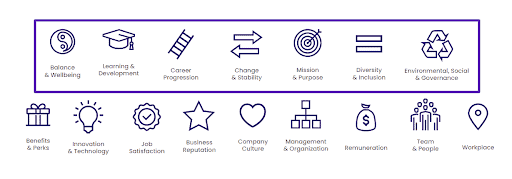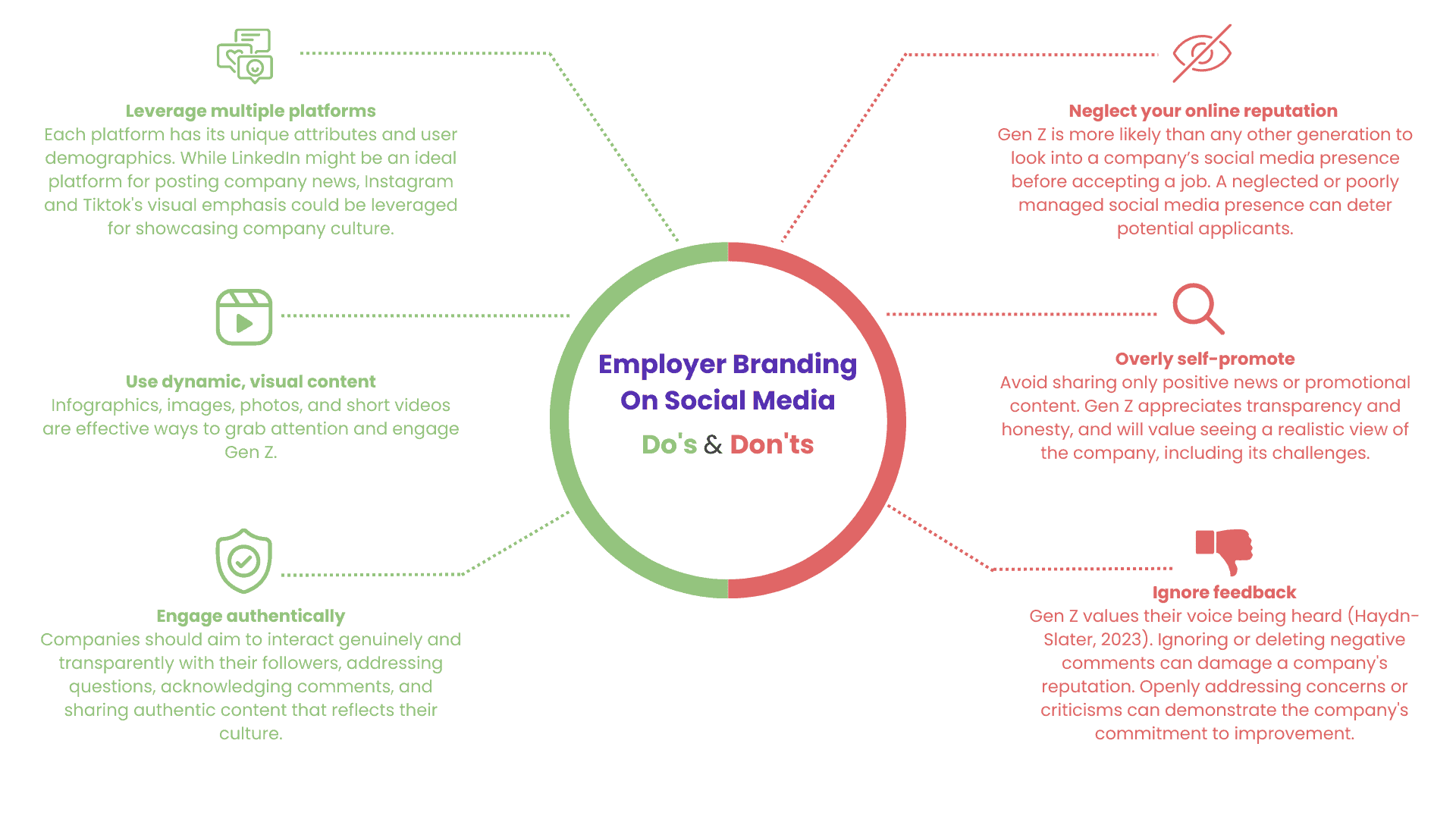
Generation Z, born between 1997 and 2012, is not just another demographic group – they are the future of the workforce. By 2025, this dynamic cohort is projected to comprise a staggering 27% of the global workforce and make up one-third of the world’s population (WEF, 2023). However, it’s not just their sheer numbers that set them apart; Gen Z has been profoundly shaped by the world in which they’ve grown up. From a young age, Gen Z has witnessed monumental societal shifts, economic upheavals, and the rapid rise of game-changing technologies like the internet. They are the true digital natives, immersed in a world of smartphones, social media, and instant connectivity that has become inseparable from their daily lives. Such continuous immersion in an ocean of information and a globally connected environment has indelibly shaped their work-related values.
Work values are defined as the importance that individuals place on various facets of the work environment (Kalleberg & Marsden, 2019). These values are instrumental in shaping a company’s employer brand and play a crucial role in talent acquisition and retention. Studies reveal that Gen Z exhibits distinctive work values, necessitating employers to evolve and adjust their branding strategies to resonate with them.
Although work values can be categorized in various ways, this analysis will utilize the framework provided by Link Humans’ 16 Employer Branding attributes. This article explores seven key attributes that research suggests have the greatest influence on Gen Z’s decision to join or remain with a company (Bierbrier, 2022; Ruzic et al, 2023; Emanuelsson & Turesson, 2023; Carbajal-Cribillero et al, 2022). Furthermore, it’s essential to bear in mind that this generation is not a homogeneous entity. Factors such as personality, gender, culture, socio-economic background, and industry have all been shown to influence Gen Zers’ work values (Bierbrier, 2022).
Attracting Gen Z
Environmental, Social & Governance
Gen Z exhibits a strong preference for employers committed to sustainability, social justice, and ethical leadership. This generation is deeply concerned about climate change and expects corporations to take significant steps towards environmental sustainability (Deloitte, 2023). Furthermore, they seek to work for socially responsible organizations that positively impact their communities (Ngoc et al, 2022). This preference is particularly evident among Gen Z women, who display a higher motivation to apply for jobs associated with sustainable initiatives compared to their male counterparts (Rzemieniak & Wawer, 2021). From a governance standpoint, Gen Z values ethical conduct in business practices, actively rewarding companies with strong governance and accountability measures (Pederson et al., 2022). Accustomed to having information readily available, they also appreciate employers who adopt transparent practices, including regular company updates, open forums for queries and feedback, and candidness about business decisions and challenges (Seemiller & Grace, 2017).
Mission & Purpose
Gen Z seeks work that aligns with their personal values and allows them to make a positive impact on the world. According to a study by Deloitte (2023), Gen Z prefers to work for organizations that have a clear, socially responsible mission and a purpose that transcends profit-making. Additionally, they value employers who empower them to contribute towards these goals directly. In fact, lack of purpose in their roles is a common reason for Gen Z employees to consider job changes and 39% of Gen Zers say they have turned down employers that do not align with their personal values.
Diversity & Inclusion
Growing up in a multicultural and interconnected world, this generation values diversity in all its forms – racial, ethnic, gender, and beyond (Pandita, 2022). Inclusion is equally non-negotiable for this generation. They yearn for a sense of belonging and expect their employers to make genuine efforts to create inclusive workplaces (Deloitte, 2023). Research shows that Gen Z is more likely to accept job offers from companies that demonstrate commitment to diversity and inclusion (Rakhmad et al, 2021), and ⅔ of Gen Z say they would not accept their dream job opportunity with a company that has a poor diversity & inclusion track record (Untapped, 2022).
Balance & Wellbeing
Burnout is a significant factor causing Gen Z to leave their jobs (Deloitte, 2023). Consequently, Gen Z places considerable importance on wellbeing and the pursuit of work-life balance. They are drawn to workplaces that foster holistic wellness through wellness programs and mental health support, and they consider this before accepting a job (Schroth, 2019). They also want schedule flexibility and the ability to work remotely when it suits them (Chillakuri & Mahanandia, 2018). Waworuntu et al.’s study (2022) underscores the positive impact of a balanced work-life on Gen Z’s job performance. Conversely, companies that fail to ensure such balance may witness a spike in Gen Z attrition, as they migrate towards more balanced environments.
Career Progression, Learning & Development
Gen Z harbors a strong ambition for swift career progression, favoring employers who offer well-defined advancement opportunities (Rzemieniak & Wawer, 2021). They also value regular feedback and continuous learning to hone their skills and potential (Hampton & Welsh, 2019). Multiple studies corroborate that career advancement and learning opportunities rank highest among Gen Z’s values (Sihombing, 2021; De Boer & Bordoloi, 2022; Maloni et al, 2019). Survey data highlight the significant link between the lack of career growth opportunities and Gen Z’s propensity to exit jobs (Pelta, 2023; Melore, 2022). However, a gender-based study by Arora et al. (2020) revealed that women in Gen Z tend to prioritize learning and development over career progression, unlike their male counterparts, who lean towards the reverse. Nevertheless, Bierbrier (2022) suggests it’s essential to delineate job functions clearly and realistically to better manage expectations. This is because Gen Z will not hesitate to leave an employer if their role doesn’t align with their initial expectations (Chillakuri & Mahanandia, 2018).
Change & Stability
Job stability is of paramount importance to Gen Z in their career considerations. Observing the economic unpredictability of today’s world, Gen Z is shifting away from the “gig economy” and contractual work—favorable choices for previous generations—towards more secure, long-term employment (Bierbrier, 2022; Maloni et al, 2019). Notably, job instability can incite feelings of anxiety among Gen Z employees, potentially undermining their work performance, job satisfaction, and eventually leading to employee turnover (Nurjanah & Indawati, 2021).
Leveraging Social Media
The Gen Z Job Search: Platforms and Preferences
A 2019 study by McCrindle provides some intriguing insights into Gen Z’s online behavior. It shows that 59% of Gen Z undertake an online exploration to uncover others’ perceptions about an organization. Additionally, 36% delve into a company’s social media presence as part of their research, while 35% actively seek out images of the organization’s workspace and working environment. This demonstrates a considerable shift from previous generations, as Gen Z emerges as the most likely demographic to scrutinize a company’s social media presence before committing to a job offer.
For Gen Z, job hunting is a digital journey that unfolds across a variety of platforms. Their toolbox includes both mainstream social media and professional networking sites. LinkedIn remains a staple for professional networking and job listings, while Twitter provides real-time company updates and industry news, which Gen Z values (Carbajal-Cribillero et al, 2022). Yet, Gen Z’s digital footprint extends beyond the traditional job-search terrain. Instagram and TikTok, for instance, provide a more laid-back setting where companies can authentically flaunt their culture and values through creative and catchy content (Deloitte, 2023). Research from Steinbacher (2022) even suggests that TikTok, despite its unconventional status as a job-search platform, could be an effective tool for employer branding. But Gen Z’s online exploration doesn’t stop there. They venture into forum websites like Reddit to obtain unfiltered, candid insights about potential employers, engaging in peer discussions to get the inside scoop. Employee review sites like Glassdoor are another go-to source, offering an internal perspective on companies. It’s also crucial to note that the internet is an ever-changing landscape, with new platforms being continuously introduced. Up-and-coming platforms like Threads are quickly gaining traction among this generation. Employers should keep an eye on these new platforms as they can offer novel ways to reach and engage Gen Z.
Gen Z Attitudes Towards Employer Branding on Social Media
Gen Z’s expectations of employer branding on social media reflect their broader digital consumption habits. Steinbacher (2022) emphasized the importance of “the mere exposure effect,” which posits that repeated exposure to an object or brand can positively impact one’s attitude towards it. This underlines the importance of a sustained and engaging social media presence for potential employers.
When it comes to content, Gen Z tends to favor dynamic, visually engaging posts. This includes infographics, images, photos, and short videos that capture attention in the first 10 seconds (Carbajal-Cribillero et al, 2022). Testimonials from current employees and leaders, brief texts with key information at the beginning, and the strategic use of slogans and hashtags are also effective ways to engage this audience.
Moreover, Steinbacher (2022) noted that authenticity is crucial in appealing to Gen Z. As digital natives, Gen Z values transparency and authenticity, and they are quick to dismiss anything that seems contrived or overly promotional. This calls for companies to share not just their successes, but also their challenges, work culture, and values, providing a more holistic and honest view of their identity.
Dos and Don’ts
When it comes to using social media for employer branding, it’s crucial for organizations to understand where their target audience is and how to reach them effectively.
DO:
- Leverage multiple platforms: Each platform has its unique attributes and user demographics. While LinkedIn might be an ideal platform for posting company news, Instagram and Tiktok’s visual emphasis could be leveraged for showcasing company culture.
- Engage authentically: Companies should aim to interact genuinely and transparently with their followers, addressing questions, acknowledging comments, and sharing authentic content that reflects their culture.
- Use dynamic, visual content: Infographics, images, photos, and short videos are effective ways to grab attention and engage Gen Z.
DON’T:
- Neglect your online reputation: Gen Z is more likely than any other generation to look into a company’s social media presence before accepting a job. A neglected or poorly managed social media presence can deter potential applicants.
- Overly self-promote: Avoid sharing only positive news or promotional content. Gen Z appreciates transparency and honesty, and will value seeing a realistic view of the company, including its challenges.
- Ignore feedback: Gen Z values their voice being heard (Haydn-Slater, 2023). Ignoring or deleting negative comments can damage a company’s reputation. Instead, openly addressing concerns or criticisms can demonstrate the company’s commitment to improvement.
Conclusion
Today, the digital footprint of a company’s employer reputation is more important than ever before. Keeping a vigilant eye on the virtual chatter about your company amongst past, present, and potential future employees has become a crucial component of corporate strategy (see Link Humans EBI). This digital dialogue shapes the perception of your company in the eyes of the most influential demographic in today’s job market: Gen Z.
Gen Z, ambitious and value-driven, is revamping the job market and workplace norms. Their job search tactics and work values, deeply rooted in their digital aptitude and commitment to diversity, sustainability, and work-life balance, are triggering shifts in employer branding strategies. Companies need to adapt to attract, retain, and cultivate this influential generation by developing a dynamic social media presence, ensuring inclusivity, providing clear career growth opportunities, and aligning business actions with social causes. Recognizing that this young generation’s values may evolve, constant adaptation is key to maintaining an attractive and competitive employer brand.
By Matthew Sefton, Data Analyst at Link Humans. Learn more about what the Employer Brand Index can do for your organization’s reputation as an employer.
References
- Arora, S., Dubey, V., & Vyas, S. (2020). Study of work values of gen Z students. International Journal of Technology and Globalisation, 8(3/4), 240. https://doi.org/10.1504/ijtg.2020.112179
- Bierbrier, C. V. (2022). Work value preferences of generation Z in the United States (thesis).
- Carbajal-Cribillero, M., Javier-Niño, G., Mäckelmann, M., & Gallardo-Echenique, E. (2022). Employer branding on social media to engage generation Z. Marketing and Smart Technologies, 469–478. https://doi.org/10.1007/978-981-16-9272-7_38
- Chillakuri, B., & Mahanandia, R. (2018). Generation Z entering the workforce: The need for sustainable strategies in maximizing their talent. Human Resource Management International Digest, 26(4), 34–38. https://doi.org/10.1108/hrmid-01-2018-0006
- de Boer, P., & Bordoloi, P. (2022). Nationality differences in gen Z work values: An exploratory study. Journal of International Education in Business, 15(2), 373–392. https://doi.org/10.1108/jieb-09-2021-0088
- Emanuelsson, & Turesson. (2023). The work values of Generation Z (thesis).
- Gen Z don’t want to work for you. here’s how to fix that. WEF. (2023). https://www.weforum.org/agenda/2022/05/gen-z-don-t-want-to-work-for-you-here-s-how-to-change-their-mind/
- Hampton, D., & Welsh, D. (2019). Work values of Generation Z Nurses. JONA: The Journal of Nursing Administration, 49(10), 480–486. https://doi.org/10.1097/nna.0000000000000791
- Kalleberg, A. L., & Marsden, P. V. (2019). Work values in the United States: Age, period, and generational differences. The ANNALS of the American Academy of Political and Social Science, 682(1), 43–59. https://doi.org/10.1177/0002716218822291
- Maloni, M., Hiatt, M. S., & Campbell, S. (2019). Understanding the work values of Gen Z Business Students. The International Journal of Management Education, 17(3), 100320. https://doi.org/10.1016/j.ijme.2019.100320
- McCrindle. (2019). (rep.). Understanding Generation Z.
- Melore, C. (2022, February 4). Quitting already? survey reveals 2 in 3 gen Z workers will leave their jobs within one year. Study Finds. https://studyfinds.org/gen-z-workers-leave-their-jobs/
- Nguyen Ngoc, T., Viet Dung, M., Rowley, C., & Pejić Bach, M. (2022). Generation Z job seekers’ expectations and their job pursuit intention: Evidence from transition and emerging economy. International Journal of Engineering Business Management, 14, 184797902211125. https://doi.org/10.1177/18479790221112548
- Nurjanah, & Indawati. (2021). Effect of Emotional Intelligence on Employee Engagement and Job Satisfaction with Work-Life Balance as Intervening Variables in the Generation Z in Surabaya. https://doi.org/https://doi.org/10.59889/ijembis.v1i3.37
- Pandita, D. (2021). Innovation in talent management practices: Creating an innovative employer branding strategy to attract generation Z. International Journal of Innovation Science, 14(3/4), 556–569. https://doi.org/10.1108/ijis-10-2020-0217
- Pederson, K., Merriman, M., & Oktem, C. (2022, December 6). Why gen Z matters and what boards should know. EY. https://www.ey.com/en_us/board-matters/why-gen-z-matters-and-what-boards-should-know
- Pelta, R. (2022, January 27). Generation Z in the workplace: A changing workforce. FlexJobs Employer Blog. https://www.flexjobs.com/employer-blog/generation-z-workforce/
- Rakhmad, A. A., Kurniawan, D. T., II, O. F., & Kusnayain, Y. I. (2021). How employer branding attract the generation Z students to join on start-up Unicorn. JBMP (Jurnal Bisnis, Manajemen Dan Perbankan), 7(2), 33–47. https://doi.org/10.21070/jbmp.v7i2.1531
- Ruzic, Benazic, & Paliaga. (2023). Employer Branding: An Investigation Into The Differences In Perception Of The Attractiveness Dimensions Among Generation Z Members In Croatia.
- Rzemieniak, M., & Wawer, M. (2021). Employer branding in the context of the company’s Sustainable Development Strategy from the perspective of gender diversity of generation Z. Sustainability, 13(2), 828. https://doi.org/10.3390/su13020828
STAY CONNECTED.
DATA-DRIVEN EMPLOYER
BRAND INSIGHTS.
Our newsletter is exclusively curated by our CEO, Jörgen Sundberg, for leaders who make decisions about talent. Subscribe for updates on The Employer Branding Podcast, new articles, eBooks, research and events we’re working on.











